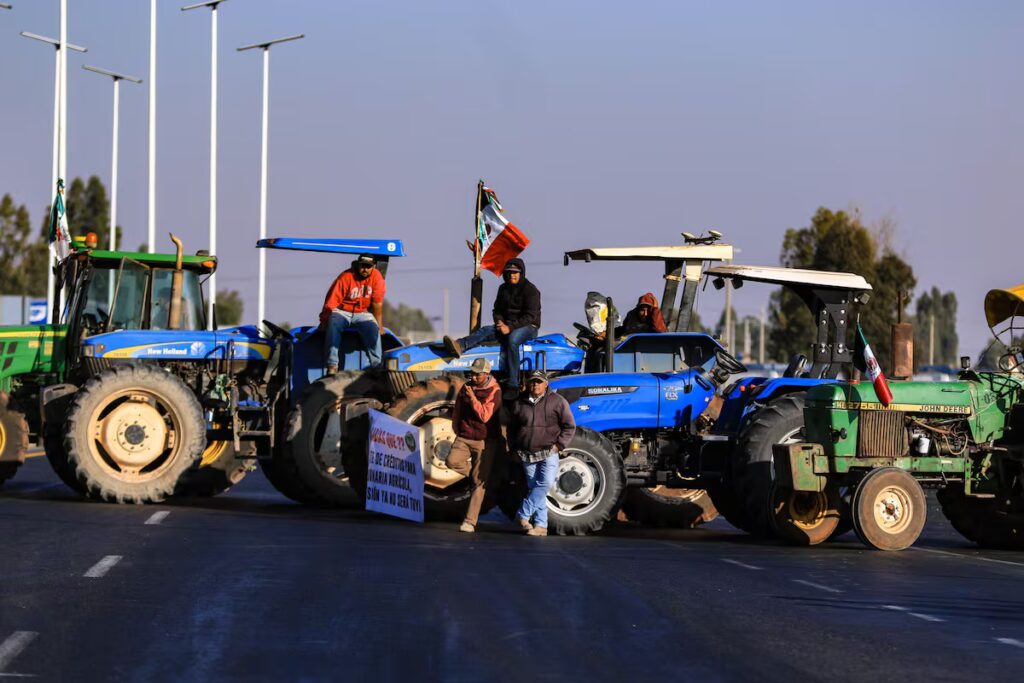
The relationship between agricultural organizations and Claudia Sheinbaum’s government risks reaching a boiling point. Groups of protesters closed checkpoints, roads, customs and border bridges for ten hours on Monday, a protest that has the support of hauliers. The protesters threaten to intensify in the next few hours the challenge to the Executive in its demand for safety on the roads and better prices for their crops. The organizations want to raise the temperature in response to statements by Interior Secretary Rosa Icela Rodríguez, who disqualified the protests by saying they had political overtones and stating that “investigation files” have been opened to the leaders of the protests over the cuts.
The response to the government in charge was almost immediate. “To say that there are political party interests is the stupidest thing I’ve ever heard,” said Eraclio Rodríguez, a member of the National Front for the Salvation of the Mexican Campaign and former federal representative for Chihuahua of the PT, one of Morena’s allies. Rodríguez and the farmers are demanding higher remuneration for the crops of beans, corn, tomatoes, melons and avocados. “We know what we are doing; if they imprison us, at least they will feed us and if they kill us, they will do us a favor”, launched the leader in response to threats from Rosa Icela Rodríguez regarding the judicialization of some demonstrators.
The protesters are demanding that their crops be purchased at 100% of the cost of production, plus 30% profit. This instead of the 50% of production offered by the Sheinbaum administration. “We are losing 50% of the investment. We don’t want to reach production costs, we want profit,” explains the farmer leader. Groups view purchase amounts as an indispensable part of the negotiation. “We are in the middle of the harvest and we have to sell to pay all the financial commitments we have with the trading houses, who are the only ones who don’t trust us and we can’t make them look bad,” says Eraclio Rodríguez.
To put pressure on the government, farmers, with the support of transporters, closed 40 major national traffic routes, including the Mexico-Toluca highway; Mexico-Puebla, some sections of Mexico-Querétaro, as well as partial blocks in Guanajuato, Aguascalientes. Another group of farmers occupied for several hours the Córdova International Bridge in Ciudad Juárez (Chihuahua), one of the most important passages between Mexico and the United States.
The need for manufacturers to increase revenue from their products superseded other demands in the protesters’ petition, including quick passage of President Sheinbaum’s Water Act, which is in the hands of Congress. “The water law is not the most important thing for us, we need the government to pay us for our crops at fair prices,” the farmer leader said. Morena’s parliamentary leaders have offered to amend the law, which must be approved by December 15.
Among the changes that the legislators of the majority bloc have advanced to this newspaper are changes to the concessions for the use of water, which can no longer be transferred between private individuals, having to return them to the State so that the National Water Commission (CONAGUA) can reassign them. According to farmers interviewed, this will make it impossible for them to inherit or sell their lands, since without permission to use the water they have no value.
The opening of the Legislature to change the law had no effect in deactivating the mobilizations. The peasant and transport organisations, despite opening some points to traffic on Monday afternoon, have decided to hold the day of protest until there is a favorable official response. They do not rule out that tractors, trucks, buses and vehicles of all types will once again impede traffic in some of the 22 states that recorded cuts this Monday. “We hoped to reach an agreement, we hoped that the president and the interior minister would be more measured in their speech, which in no way contributes to governance,” he said.
The cable has been stretched in the last few hours following the statements of the Minister of the Interior. The political connections of the faces of the protest were the Government’s first blow. “They don’t inform the secretary and the president how things are. How do you think the PRI and the PAN will move all the people we are moving? Neither the PRI, nor the PAN, nor Morena together can mobilize the people who are mobilizing today,” said Rodríguez, the peasant leader.
Not even the threats of possible arrest of their leaders made them retreat. “Yes, we are afraid, but we are forced to take to the streets to defend our families. A farmer who does not defend his family is worth as much as a mother”, added the producer. However, they left the door wide open for dialogue and said they will participate in the dialogue table convened by the government this Tuesday morning. “We are willing to talk, we hope they change their attitude and sit down to talk in a positive way,” concluded the farmer leader.





